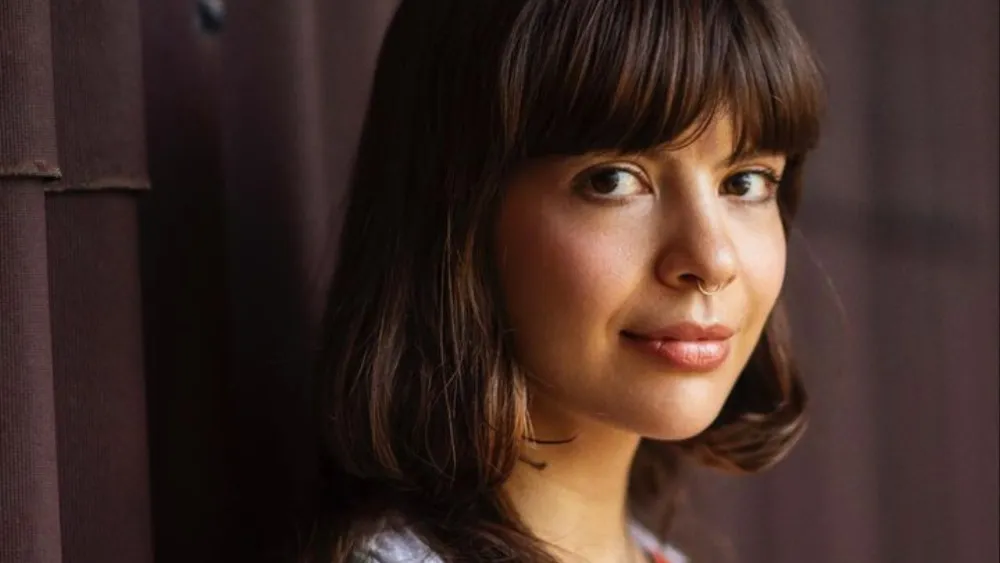Copyright Variety

Slovenian filmmaker Kukla, whose debut feature “Fantasy” premiered at Locarno Film Festival and played this week at Thessaloniki Film Festival, is working on her sophomore feature. The project has been mentioned briefly previously, but Variety has exclusive additional details, including the working title, casting, and Kukla’s sources of inspiration. Her next project, which has the working title “Good Girl,” is a modern take on the Ancient Greek comedy “Lysistrata,” by Aristophanes, in which an Athenian woman advocates that women from warring city states should stop having sex with men until they stop fighting in the war between them, Kukla tells Variety in the Greek coastal city of Thessaloniki, with Mount Olympus visible across the sea. In this updated version of “Lysistrata,” a third world war is threatened, and a TikToker “randomly speaks her thoughts out loud that we should stop having sex with men and stop giving birth to their kids if they want to kill them, and she starts a huge movement all over the world,” Kukla says. The film is partly inspired by the Korean 4B Movement, a radical feminist movement that called for a rejection of sex, giving birth, dating and marriage. This started as a response to male violence against women, but broadened out to become a protest against male oppression. It spread to the U.S. following President Trump’s victory last year. The new film will be set in different territories, including in the Balkans and France, “because I think that female solidarity will save the world, and I really want to show the strength of women everywhere,” Kukla says. The lead actresses from “Fantasy,” Sarah Al Saleh, Mina Milovanović and Mia Skrbinac, will also appear in the second feature. Skrbinac is a professional actress but Al Saleh and Milovanović are non-professionals. All three also appeared in Kukla’s 2020 short “Sisters,” which featured the same characters and storyline as “Fantasy,” and won the Grand Prix at Clermont-Ferrand Intl. Short Film Festival. “Good Girl” is “like an homage to them, because we have been on a long journey together, and we have grown up together as people and as filmmakers as well,” Kukla says. Like “Good Girl,” “Fantasy” also has its roots in Kukla’s interest in patriarchy, gender roles and identity. The film centers on three tomboys, Mihrije, Sina and Jasna, best friends in Slovenia, who refuse to conform to the conservative norms of their communities, and traditions such as arranged marriages. Their world is turned upside down when they meet Fantasy, a transgender woman, which leads them on a journey of self-discovery in which they explore alternative approaches to gender roles and sexuality. Alina Juhart, who plays Fantasy, is well-known in the Balkans because she took part in a TV talent show. “It’s very interesting how, on the one hand, it’s such a conservative place, but on the other, they’re very welcoming, and that’s where I see the power of pop culture. That’s why the film has a lot of pop culture moments, because I think it’s good to make it approachable for the viewer.” Regarding her three young lead actresses, she says: “I really wanted them to be co-creators of the film. In a sense they were co-editing the script with me,” so that it was seen through their eyes. “I really believe I found people who have the essence of the characters in themselves. So, it’s not that they were playing themselves, but some part of themselves. That’s why it was a very transformative process for all of us. They were speaking their words, from their perspective. It was really important to me that this film came from within, that we are represented equally.” The idea for the film occurred to Kukla 10 years ago when she became interested in the phenomenon of “sworn virgins,” who were women in the Balkans in times past who took a vow of chastity, and lived and dressed as men, and were considered to belong to a third gender. She had the idea to transfer this rejection of femininity and traditional gender roles to a contemporary environment, albeit one in which the patriarchy still holds sway. In this social setting, they would be called tomboys, who fight like boys and are fiercely independent. “Then there was a spark of an idea: What would happen if a sworn virgin met a transgender woman in the Balkans?,” she says. “That meeting was a spark that expanded the whole view on femininity in the Balkans. And through that, I came to the core questions like, ‘Am I able to see myself uncontaminated by the male gaze? Or, where is the female eye? Where’s the female voice? And, from there, it goes in so many directions.” Kukla lives in Belgrade, Serbia, but grew up in Slovenia, and her parents came from North Macedonia. Her birth name is Katarina Bogdanovic, but Kukla, which means “doll” in Macedonian, was her nickname as a child and stuck. “In the late 90s and early 2000s [Slovenia] was a very xenophobic place,” Kukla says. “My national identity was drowned in shame. I speak perfect Slovenian, but when they heard my mother speaking, there was a lot of bullying. So, we just weren’t accepted as a community.” She adds: “And then the integration process successfully, let’s say, manifested. And now it has become some sort of a subculture. So it’s a very interesting cultural phenomenon. I’m really interested in those fluidities of identity. So I’m reflecting also on that in the film, because every diaspora is always more conservative than the original country. And also, there’s a mix of a lot of different cultures.” Fantasy acts as a catalyst in the film, leading to a questioning of views on identity, including queer identity in the Balkans. “Fantasy is not afraid of her vulnerability, but also not afraid of her power. I wanted to include this Balkan queerness in my film, which is not dependent on Western queerness. I think we have our own version of it,” Kukla says. “I don’t see her as a passive character at all. I think she’s very active, but she shows the other three girls that with her stance on her identity and with her honesty and courage that there are so many versions of femininity, and that you can live your own truth. And that is something that I was very eager to show in the film, because the Balkans is a very contradictory place. It’s very transphobic, homophobic and misogynistic place, yet her DMs are full of straight men with families. That was the contradiction that I was quite mad at, because there’s a lot of sexual interest in trans women, but no interest in them as normal humans, as equals in society.” “Fantasy” is produced by Lija Pogačnik, Barbara Daljavec and Vlado Bulajić for Slovenia’s December. The film, which also screened in competition at Sarajevo Film Festival, is being sold internationally by Totem Films. The Hollywood Reporter first reported on Kukla’s second feature.



